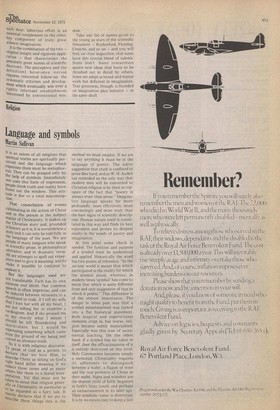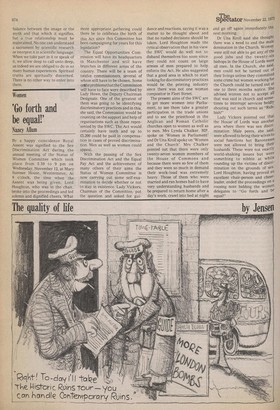Religion
Language and symbols
flartin Sullivan
It is an axiom of all religions that spiritual truths are spiritually perceived and the language which expresses them must be metaphorical. They can be grasped only by the help of symbols. Immediately one uses this form of expression, People think truth and reality have flmvn out the window. This atti tude is due to a total misconception.
That constellation of events culminating in the action of Christ and in His person is the subject matter of Christianity. It makes up the Christian story and, grounded in history as it is, it is nevertheless a story and it can only be told fully in the language of the poet. We are People of many tongues who speak in scientific prose, in philosophical utterance, and in dramatic verse. All are attempts to spell out experience and to give it meaning, and/to Make it possible to continue to exPlore it.
But the languages used are not translatable. Each has its own Purpose and idiom. Our common Speech is often imprecise, and can be reduced between intimates to a shorthand or code. If! tell my wife that I love her with all my heart, I am not asking her to examine a cardiogram, And if she pressed me to
, say exactly what I meant I
snould be left floundering and inarticulate; but I would be expressing something which came from the ground of my being and voiced an ultimate truth. So it is with religious discourse. To speak of God as a person, to declare that we love Him, to describe Christ as sitting on God's right hand defies meaning if we reduce those terms and so many Others like them to a literal inter. pretation. Yet this must not be taken to mean that religion generallY or Christianity in particular is to be regarded as a fairy tale. It merely declares that if we are to describe these things this is the
method we must employ. If we are to say anything it must be in the language of poetry. The naive suggestion that truth is confined to prose dies hard, and as W. H. Auden has reminded us the only way that modern men will be converted to Christian religion is by their acceptance of the fact that "poetry is always truer than prose." Imaginative language speaks far more profoundly, more effectively, more convincingly and more truly than the bare signs of scientific description. Human nature itself is constituted in this way and finds its best expression and probes its deepest reality in the words of poetry and imagination.
At this point some check is needed. The function and purpose of a symbol must be understood and applied. Historically the word has two points of reference. "In the ancient world it meant that which participated in the reality for which the symbol stood, whereas, in modern times 'symbol' has come to mean that which is quite different from and only suggestive of that to which it points." This difference is of the utmost importance. The danger in times past was that a symbol misinterpreted was turned into a flat historical statement. Both magical and superstitious elements crept in, but worse, religion became subtly materialised. Especially was this true of sacramental teaching. On the other hand, if a symbol has no value in itself, then the efficaciousness of it is entirely destroyed on this level, Holy Communion becomes simply a memorial. Christianity requires its adherents to distinguish between a wafer, a flagon of wine and the real presence of Christ in their midst. Signs and wonders are the dearest child of faith, begotten in faith's lusty youth and perhaps an embarrassment in its later age. Their symbolic value is destroyed. It is by no means easy to keep a just balance between the image or the myth and that which it signifies, but a true relationship must be maintained. No one can understand a sacrament by scientific research or interpret it in scientific language. When we take part in it or speak of it, we allow deep to call unto deep, as indeed we are obliged to do in so many human experiences. Spiritual truths are spiritually discerned. There is no other way to enter into them.

































 Previous page
Previous page